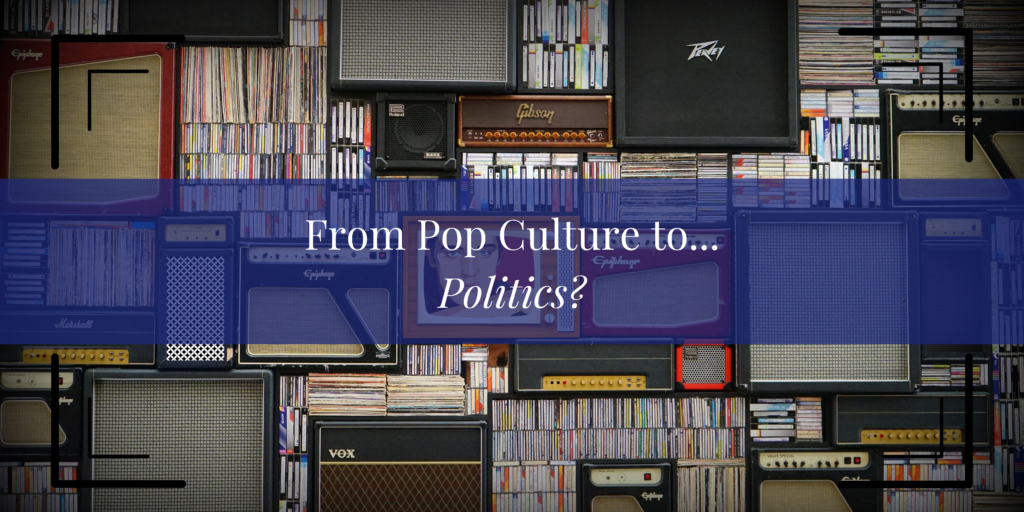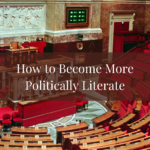The Historical Connection Between Pop Culture and Politics
Art has always been a rallying force upon which culture and civilizations have been built. Books, theatre, story-telling, music, and later film would capture the values and stories of a nation to ensure that citizens identify with and feel loyal to the nation. See, pop culture and politics have a mutually sustaining force. In centuries past, the idea of a nation-state (a country) was contentious, especially over a large area. You had to ensure loyalty to your government and define your population in opposition to your neighbour. To have an identity of ‘French’ or ‘Ethiopian’ you had to define what that meant, what it means to be a citizen, and what benefits one might derive from that. Art, and thus popular culture, support in building a nation’s identity. By looking at pop culture, we can learn a lot about a society by what is shown, and importantly, what isn’t shown.
Pop Culture is Politics
Pop culture holds up a mirror to society and reflects the values, attitudes, and stories of the people living there. Given that politics is also related to the values of the people, we can begin to see the mutuality of the system taking form. Pop culture and politics are built around values that people hold. But where do values come from? Well that is a complicated question, and we might end up in an infinite loop in which some people’s values come from the political system they were raised in. But for simplicity’s sake, we can understand values coming from thought systems, so religion and philosophy. Both of these permeate society in ways that are seen and unseen, you may never have read nihilist theory and you could be the biggest nihilist in the world (but it doesn’t really matter). If our values inform our politics then our politics are reflected back through pop culture. Or what we see in pop culture then reflects the politics of the people. I think what’s important here is to think of politics in the societal form rather than purely governmental. Pop culture doesn’t undergo full-scale transformations under new political leadership, though there is some.
Pop culture I’m going to argue has been shunted to the side in political conversations; it can definitely be seen as frivolous, with connotations of tabloids, reality TV, and obsession with the dating lives of celebrities. However a deeper look at pop culture can reveal echo chambers, which kinds of celebrities people relate to and why, and what views popular TV shows/movies/music espouse to watchers and listeners. Everyone engages with pop culture, whether ‘high brow’ cinema or trashy reality TV and it reflects the values, mindsets, and politics of those who engage.
Try a New Perspective for an Hour or Two
It may sound oppositional to the idea that pop culture reflects society, but I also view pop culture as the force that pushes society forward because it will be the first place where people are exposed to new ideas. Pop culture is able to jump across boundaries and borders and infiltrate otherwise homogenous groups. For example, if you’ve been a Christian your whole life, involved in the church, extensive religious family, and so on, you’re likely not going to look to alternative thought systems unless you are exposed to them in the form of entertainment.
Ellen DeGeneres came out on primetime television in 1997 nearly 20 years before gay marriage was legalized across the United States. Ellen’s coming out and subsequent success as a day-time talk-show host, likely did more to convince people of the ‘acceptability’ of the gay rights movement than congressional debates. This is of course an oversimplification of a decades long struggle for queer liberation, but for those of us who have had and known conservative family and community members, pop culture icons likely have done more to change their minds than rational debates or protests. People loved George Michael, Freddie Mercury, Ellen, Will & Grace. It became easier to rationalize an acceptance of queerness through symbols and icons that felt familiar and accessible, rather than an alien movement people felt disconnected to. While maybe my conclusions from these observations are flawed, there was surely a lot of backlash to each in their time; however, I think it is naive and unfair to not give celebrity and pop culture their flowers in their role in pushing the culture forward.
Which Stories Get Told
Which stories get told, and, likewise, which stories do not? This is not a question of who has the best stories, but of how inequality prevents certain storytellers from telling those stories. While pop culture has the opportunity to pull us into new perspectives, it is only able to do so when new perspectives are invited to the table. Production companies make decisions for which projects to greenlight and these decisions can be made on prejudices against certain stories or prioritizing people with a lot of privilege and connections already. The politics behind these decisions have consequences, largely for who receives representation on the screen and therefore which communities and identities are more widely accepted. This self-sustaining system makes it hard for marginalized groups to break in to entertainment spaces and thus receive less acceptance generally.
The Economic Side
Pop culture is a great tool for selling things. I’m not just talking about the rise of influencer marketing, but general consumer goods that are showcased in popular media such as fashion, furniture, food, and toys. Pop culture influences which brands people buy, style trends, food trends, and even where people choose to vacation.
Why the State Loves Pop Culture
Beyond telling a ‘common’ story and providing opportunities for identification for citizens, popular culture is also beneficial to the state for other reasons. Most obviously, economic. Cultural industries can bring in large amounts of revenue, particularly in tourism. Music and concerts also pull huge amounts of tourism dollars, just look at some stats behind Taylor Swift’s Eras Tour. And when you have a city as culturally iconic as New York, you can milk that for all the tourism money you want. A hit new show uses local landmarks? Jackpot.
Oh also, the Olympics. Every two years a country has the opportunity to put on a show that literally the whole world will watch? Tourism, cultural cache, and improved relations with other states can make the Olympic bid worthwhile.
Another reason the state loves pop culture? A vehicle for propaganda. A smattering of war-time movies glorifying the bravery of soldiers and the positive impact of the military is priceless. A well-oiled machine of never ending cop, FBI, and CIA shows, and you’ve built a citizenry deferent to your state violence.
Concluding Thoughts: An Imperfect Analysis
Pop culture is not a silver bullet through which we can analyze human behaviour and actions. It can also not be used as the sole means of social change. There are aspects of pop culture that are puzzling. Things people find abhorrent in media don’t necessarily translate to how they feel about real world equivalents. There are many films documenting the horrors of war, and particularly the American experience in Vietnam. However the messages of these pieces of media, do not seem to deter support for other wars. Maybe we love to be entertained at the expense of being educated. I mean a whole generation of us grew up watching Bill Nye only to turn around and deny science.
Pop culture is embedded in everyone’s lives. Unless you live a life devoid of art, music, books, and television – I don’t know how you’d find this blog if that were true – pop culture affects you. To study pop culture is an imperfect science, it sits in an uncomfortable web of reality which interacts with religion, culture, politics, psychology, philosophy and morals, and history. However I believe that pop culture is a necessary beast to tangle with, and one that is accessible to those looking to learn more.


